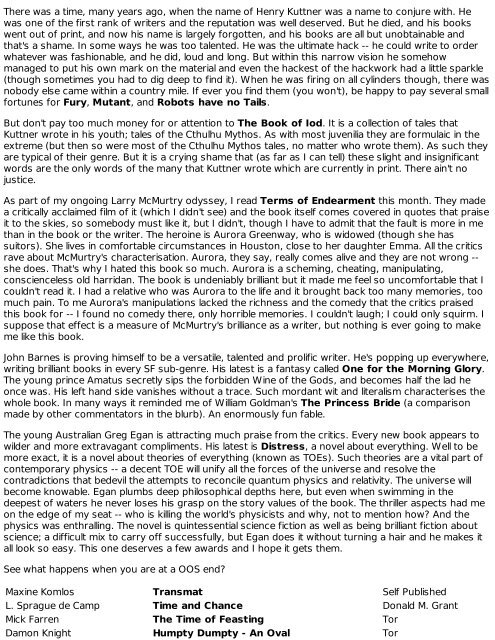Triffids Beard 2 - The Bearded Triffid
Triffids Beard 2 - The Bearded Triffid
Triffids Beard 2 - The Bearded Triffid
You also want an ePaper? Increase the reach of your titles
YUMPU automatically turns print PDFs into web optimized ePapers that Google loves.
<strong>The</strong>re was a time, many years ago, when the name of Henry Kuttner was a name to conjure with. He<br />
was one of the first rank of writers and the reputation was well deserved. But he died, and his books<br />
went out of print, and now his name is largely forgotten, and his books are all but unobtainable and<br />
that's a shame. In some ways he was too talented. He was the ultimate hack -- he could write to order<br />
whatever was fashionable, and he did, loud and long. But within this narrow vision he somehow<br />
managed to put his own mark on the material and even the hackest of the hackwork had a little sparkle<br />
(though sometimes you had to dig deep to find it). When he was firing on all cylinders though, there was<br />
nobody else came within a country mile. If ever you find them (you won't), be happy to pay several small<br />
fortunes for Fury, Mutant, and Robots have no Tails.<br />
But don't pay too much money for or attention to <strong>The</strong> Book of Iod. It is a collection of tales that<br />
Kuttner wrote in his youth; tales of the Cthulhu Mythos. As with most juvenilia they are formulaic in the<br />
extreme (but then so were most of the Cthulhu Mythos tales, no matter who wrote them). As such they<br />
are typical of their genre. But it is a crying shame that (as far as I can tell) these slight and insignificant<br />
words are the only words of the many that Kuttner wrote which are currently in print. <strong>The</strong>re ain't no<br />
justice.<br />
As part of my ongoing Larry McMurtry odyssey, I read Terms of Endearment this month. <strong>The</strong>y made<br />
a critically acclaimed film of it (which I didn't see) and the book itself comes covered in quotes that praise<br />
it to the skies, so somebody must like it, but I didn't, though I have to admit that the fault is more in me<br />
than in the book or the writer. <strong>The</strong> heroine is Aurora Greenway, who is widowed (though she has<br />
suitors). She lives in comfortable circumstances in Houston, close to her daughter Emma. All the critics<br />
rave about McMurtry's characterisation. Aurora, they say, really comes alive and they are not wrong -she<br />
does. That's why I hated this book so much. Aurora is a scheming, cheating, manipulating,<br />
conscienceless old harridan. <strong>The</strong> book is undeniably brilliant but it made me feel so uncomfortable that I<br />
couldn't read it. I had a relative who was Aurora to the life and it brought back too many memories, too<br />
much pain. To me Aurora's manipulations lacked the richness and the comedy that the critics praised<br />
this book for -- I found no comedy there, only horrible memories. I couldn't laugh; I could only squirm. I<br />
suppose that effect is a measure of McMurtry's brilliance as a writer, but nothing is ever going to make<br />
me like this book.<br />
John Barnes is proving himself to be a versatile, talented and prolific writer. He's popping up everywhere,<br />
writing brilliant books in every SF sub-genre. His latest is a fantasy called One for the Morning Glory.<br />
<strong>The</strong> young prince Amatus secretly sips the forbidden Wine of the Gods, and becomes half the lad he<br />
once was. His left hand side vanishes without a trace. Such mordant wit and literalism characterises the<br />
whole book. In many ways it reminded me of William Goldman's <strong>The</strong> Princess Bride (a comparison<br />
made by other commentators in the blurb). An enormously fun fable.<br />
<strong>The</strong> young Australian Greg Egan is attracting much praise from the critics. Every new book appears to<br />
wilder and more extravagant compliments. His latest is Distress, a novel about everything. Well to be<br />
more exact, it is a novel about theories of everything (known as TOEs). Such theories are a vital part of<br />
contemporary physics -- a decent TOE will unify all the forces of the universe and resolve the<br />
contradictions that bedevil the attempts to reconcile quantum physics and relativity. <strong>The</strong> universe will<br />
become knowable. Egan plumbs deep philosophical depths here, but even when swimming in the<br />
deepest of waters he never loses his grasp on the story values of the book. <strong>The</strong> thriller aspects had me<br />
on the edge of my seat -- who is killing the world's physicists and why, not to mention how? And the<br />
physics was enthralling. <strong>The</strong> novel is quintessential science fiction as well as being brilliant fiction about<br />
science; a difficult mix to carry off successfully, but Egan does it without turning a hair and he makes it<br />
all look so easy. This one deserves a few awards and I hope it gets them.<br />
See what happens when you are at a OOS end?<br />
Maxine Komlos Transmat Self Published<br />
L. Sprague de Camp Time and Chance Donald M. Grant<br />
Mick Farren <strong>The</strong> Time of Feasting Tor<br />
Damon Knight Humpty Dumpty - An Oval Tor


